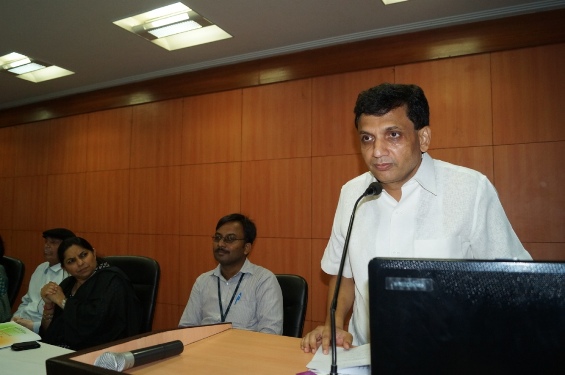13 Aug 2013|Noida | Amity University Campus, Sector-125 Noida
“Amendments in society and system are essential” avers R.S. Goswami, Former Chairman - Bar Council of Delhi during a panel discussion on Criminal Law (Amendment) Act 2013 at Amity Law School Centre-II, Amity University

In light of the gang rape incident of 16 December 2012, the judicial committee headed by Justice J. S. Verma was appointed by the Government of India for suggesting amendments in criminal law for dealing with sexual assault cases. On the recommendations of Verma Committee Report, “The Criminal Law [Amendment] Act, 2013 was enacted which seek to make amendments in the Code of Criminal Procedure, Indian Penal Code, Protection of Children from Sexual Offences Act as well as Indian Evidence Act. To discuss and deliberate on the issues of “The Criminal Law [Amendment] Act, 2013; Amity Law School Centre-II, Amity University organised a Panel Discussion at F-3 Block, Seminar Hall, Amity University Campus, Sector- 125, Noida.
Mr. R.S. Goswami, Former Chairman - Bar Council of Delhi; Dr Tapan Chakraborty, Former Director - - Bureau of Police Research and Development; Ms. Priya Hingorani, Senior Advocate – Supreme Court of India; Prof. Mamta Srivastava, Addl. Director – Amity Law School Centre-II were part of the Panel Discussion.
Ms. Priya Hingorani, Senior Advocate – Supreme Court of India in her opening remarks said that our legal system needs constant changes in order to be relevant as per the present society system. The need to protect women and children from sexual offences and to safeguard the basic structure of society wherein a woman can live peacefully was felt which created a need for enactment of The Criminal Law [Amendment] Act, 2013. The act encompasses features that will provide stringent punishment for crimes against women such as rape, acid attacks, voyeurism and stalking. The punishments range from life term to death penalty for the repeated offenders. Ms. Hingorani said that acts are passed but the main problem is in the awareness about the Acts. She posed a question to the audience that how many people would know that no lady can be taken into custody after 7 pm without a lady constable. The new laws have provisions for increased sentence for rape convicts, including life-term and death sentence, besides providing for stringent punishment for offences such as acid attacks, stalking and voyeurism. Through the revised Bill, the Government has amended various sections of the Indian Penal Code, the Code of Criminal Procedure, the Indian Evidence Act and the Protection of Children from Sexual Offences Act.
Mr. R.S. Goswami, Former Chairman - Bar Council of Delhi said that our ancient sculptures taught us to worship woman but still incidents like of December 16 happen in our society. These were happening before also, but this time Government was in pressure because of our youth who were demonstrating day and night from India Gate. We all felt that this incident can happen with us also. Government agreed that if stringent laws are not enforced it will be difficult to put stop on sexual offences. Mr. Goswami said that apart from amendments in law, we require amendments in our society and system. No person from highly educated class wants to contest an election, but every one want good candidates. Mr Goswami said that we all have to understand one thing that if we do some misdeed with girl, remember that our sister is also venturing out of the house, working somewhere. Talking about the The Criminal Law [Amendment] Act, 2013, Dr. Goswami said as per the amended law, a rape convict can be sentenced to rigorous imprisonment for a term not less than 20 years, which may extend to remainder of the convict’s natural life. It also provides for the death sentence to repeat offenders. And for the first time, stalking and voyeurism have been defined as non-bailable offences while acid attack convicts can get upto 10-year jail sentence.
Dr Tapan Chakraborty, Former Director - - Bureau of Police Research and Development said Government had thought of Verma Commission only after December 16 incident, although these type of incidents were happening before also. Flame of agitation was so much ignited that every department gave suggestions to the government which resulted in formation of Verma Commission, but still not all the provisions of commission were accepted by Government. Death penalty to the rapist, criminalization of marital rape, reduction in age of consent etc were part of the suggestions which were not accepted.
Students and faculty of Amity Law School Centre-II raised several questions during the occasion and benefitted from this engrossing penal discussion.